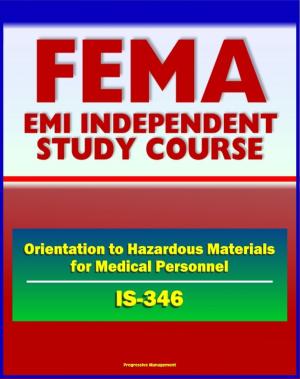Osama bin Laden: Letters from Abbottabad - Complete Declassified Internal al-Qaida Communications and Analysis, Historical Perspective and Implications for American Policy (bin Ladin and al Qaeda)
Nonfiction, Social & Cultural Studies, Political Science| Author: | Progressive Management | ISBN: | 9781476364803 |
| Publisher: | Progressive Management | Publication: | May 3, 2012 |
| Imprint: | Smashwords Edition | Language: | English |
| Author: | Progressive Management |
| ISBN: | 9781476364803 |
| Publisher: | Progressive Management |
| Publication: | May 3, 2012 |
| Imprint: | Smashwords Edition |
| Language: | English |
This unique ebook, professionally formatted for flowing-text readers, provides the complete set of declassified English-translated internal letters from Osama bin Laden from his hideout in Abbottabad, Pakistan. In addition to the letters, this compilation includes a comprehensive report from the West Point Combating Terrorism Center with analysis of the al Qaeda communications. The introduction to the report, Letters from Abbottabad, states:
This report is a study of 17 de-classified documents captured during the Abbottabad raid and released to the Combating Terrorism Center (CTC). They consist of electronic letters or draft letters, totaling 175 pages in the original Arabic and 197 pages in the English translation. The earliest is dated September 2006 and the latest April 2011. These internal al-Qa`ida communications were authored by several leaders, most prominently Usama bin Ladin. In contrast to his public statements that focused on the injustice of those he believed to be the “enemies” of Muslims, namely corrupt “apostate” Muslim rulers and their Western “overseers,” the focus of Bin Ladin’s private letters is Muslims’ suffering at the hands of his jihadi “brothers”. He is at pain advising them to abort domestic attacks that cause Muslim civilian casualties and focus on the United States, “our desired goal.” Bin Ladin’s frustration with regional jihadi groups and his seeming inability to exercise control over their actions and public statements is the most compelling story to be told on the basis of the 17 de-classified documents. “Letters from Abbottabad” is an initial exploration and contextualization of 17 documents that will be the grist for future academic debate and discussion.
As a bonus, this compilation includes an important CRS report on Al Qaeda and its affiliates deals with historical perspectives, global presence, and implications for U.S. policy. There is extensive coverage of al Qaeda in the Arabian peninsula (AQAP), North Africa/Sahel: Al Qaeda in the Islamic Maghreb (AQIM), East Africa, Somalia, Al Qaeda and Radical Islamist Extremists in Southeast Asia, Al Qaeda’s Global Strategy and Implications for U.S. Policy, and more.
The Combating Terrorism Center, housed within the Department of Social Sciences at West Point, has long recognized that captured battlefield documents have enormous value to students of terrorism. Since 2005 the longstanding partnership between the CTC and our colleagues who manage the Harmony database has facilitated the release of hundreds of documents to the public, with the intention of advancing the study of terrorism and political violence. In its own small way, this report and the release of some documents from the Abbottabad compound to the public are simply a continuation of this partnership.
The CTC is proud to continue in this role by publishing these documents, and as with previous releases two cautions are worth highlighting. First and most importantly is that these documents likely represent only a fraction of the materials reportedly taken from the compound. If declassification of subsequent documents from Abbottabad or new caches of materials from other locations is forthcoming, this would inevitably necessitate additional analysis and reflection. Thus, the report that accompanies the documents must be understood as an effort to help reassess what we know about the group, but not as a definitive commentary on al-Qa'ida's evolution or the group's current status, and we should be extremely cautious of the notion that al-Qa'ida has been defeated. Rather, the problems presented by jihadism and violent extremism more broadly will continue to shift and mutate.
This unique ebook, professionally formatted for flowing-text readers, provides the complete set of declassified English-translated internal letters from Osama bin Laden from his hideout in Abbottabad, Pakistan. In addition to the letters, this compilation includes a comprehensive report from the West Point Combating Terrorism Center with analysis of the al Qaeda communications. The introduction to the report, Letters from Abbottabad, states:
This report is a study of 17 de-classified documents captured during the Abbottabad raid and released to the Combating Terrorism Center (CTC). They consist of electronic letters or draft letters, totaling 175 pages in the original Arabic and 197 pages in the English translation. The earliest is dated September 2006 and the latest April 2011. These internal al-Qa`ida communications were authored by several leaders, most prominently Usama bin Ladin. In contrast to his public statements that focused on the injustice of those he believed to be the “enemies” of Muslims, namely corrupt “apostate” Muslim rulers and their Western “overseers,” the focus of Bin Ladin’s private letters is Muslims’ suffering at the hands of his jihadi “brothers”. He is at pain advising them to abort domestic attacks that cause Muslim civilian casualties and focus on the United States, “our desired goal.” Bin Ladin’s frustration with regional jihadi groups and his seeming inability to exercise control over their actions and public statements is the most compelling story to be told on the basis of the 17 de-classified documents. “Letters from Abbottabad” is an initial exploration and contextualization of 17 documents that will be the grist for future academic debate and discussion.
As a bonus, this compilation includes an important CRS report on Al Qaeda and its affiliates deals with historical perspectives, global presence, and implications for U.S. policy. There is extensive coverage of al Qaeda in the Arabian peninsula (AQAP), North Africa/Sahel: Al Qaeda in the Islamic Maghreb (AQIM), East Africa, Somalia, Al Qaeda and Radical Islamist Extremists in Southeast Asia, Al Qaeda’s Global Strategy and Implications for U.S. Policy, and more.
The Combating Terrorism Center, housed within the Department of Social Sciences at West Point, has long recognized that captured battlefield documents have enormous value to students of terrorism. Since 2005 the longstanding partnership between the CTC and our colleagues who manage the Harmony database has facilitated the release of hundreds of documents to the public, with the intention of advancing the study of terrorism and political violence. In its own small way, this report and the release of some documents from the Abbottabad compound to the public are simply a continuation of this partnership.
The CTC is proud to continue in this role by publishing these documents, and as with previous releases two cautions are worth highlighting. First and most importantly is that these documents likely represent only a fraction of the materials reportedly taken from the compound. If declassification of subsequent documents from Abbottabad or new caches of materials from other locations is forthcoming, this would inevitably necessitate additional analysis and reflection. Thus, the report that accompanies the documents must be understood as an effort to help reassess what we know about the group, but not as a definitive commentary on al-Qa'ida's evolution or the group's current status, and we should be extremely cautious of the notion that al-Qa'ida has been defeated. Rather, the problems presented by jihadism and violent extremism more broadly will continue to shift and mutate.















